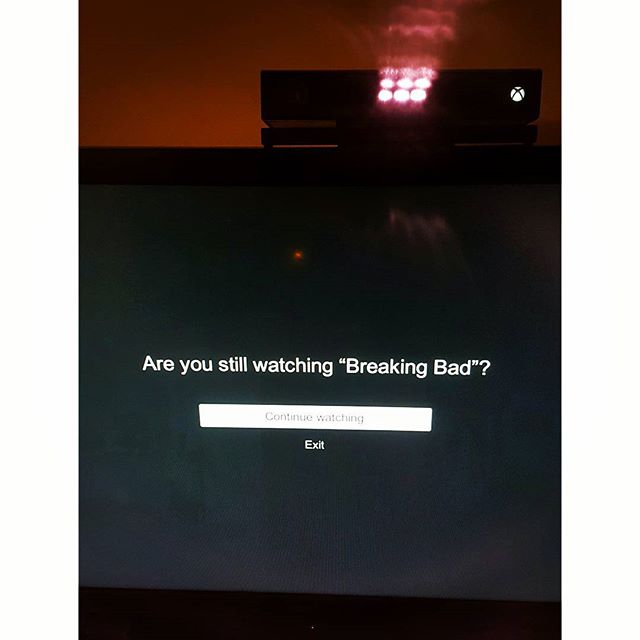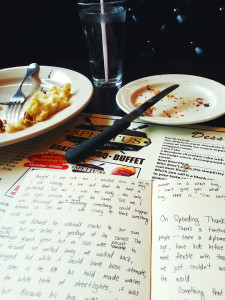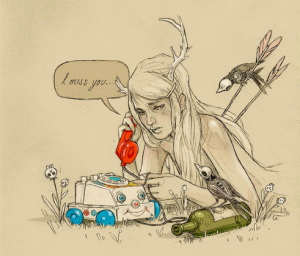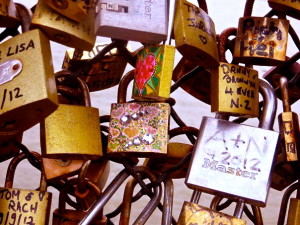
On the night of the Paris attacks, I bought a $60 pair of New Balance sneakers and ate a whole tray of frozen lasagna because I didn’t know what else to do. I shouldn’t say “else.” The horrific events rocked every news station and social media outlet, yet even a tragedy of that magnitude didn’t really affect my Friday night. I sat in my pajamas and watched Breaking Bad until midnight, as I would have if Paris had glittered from the lights of The Eiffel Tower instead of ambulances.
It’s no doubt I was disgusted. When extreme acts of cruelty shatter the lives of countless strangers I’ll never have the chance to meet, it offends me. I’m also brought to terms with my own humanity and privileged sense of security. I live a good life and while I’ve felt sad and scared before, I’ve never known true fear and danger.
My upbringing has insulated me from any kind of prolonged distress, so in the wake of chaos I seek solidarity to make things “okay” again: inspirational stories and songs of the heart, a newsfeed filled with French flags, and anecdotes that highlight humanity prevailing. I want to have good intentions and be part of this movement. I want not to feel alone.
At the same time, I can’t shake the feeling that I’m just another well-wisher voicing genuine empathy that also happens to clear a moral conscience—as if there is an appropriate amount of sorrow to dole out for the featured natural disaster or man-made catastrophe of the week:
(Lives lost) / (Miles away from location) + (Personal connection to affected community) = Appropriate sadness level
Sad emoji. Angry emoji. Peace sign.
Maybe I grieve publicly to establish myself as an engaged citizen of planet Earth, subscribing to a little voice that says, “If you have a heart, it should ache right now and people should be aware of it.”
I don’t want to exaggerate my feelings. But I am uncomfortable—and not just from the layers of processed cheese and pasta I consumed last night out of boredom and confusion about whether the world is good or bad.
I’ve decided it’s not black and white, but a gradient of gray—contrasting enough to represent the superheroes, the villains, and the faceless civilians the cartoonist didn’t bother to detail. I am a two-dimensional bystander whose actions are independent of the plot, so removed that I couldn’t change the course of the story if I tried. I’m in the background of the scene where the superhero stops a train from speeding off doomed tracks. I’m in the panel where the villain makes a clean getaway, leaving behind a cityscape in flames. In both of these scenarios, I am doing nothing.
Sometimes, I wish I were religious so I could offer a prayer to those suffering. I want to contribute something greater than the isolated thoughts that bounce around my head and seldom materialize. Yesterday, I was desperate for someone—or something—to come forward and protect us from ourselves.
This feeling is what I call Gray Discomfort: the muted heartache and helplessness following a tragedy that doesn’t have an immediate impact on you despite its grave and far-reaching consequences. The feeling is distant and in the room. You don’t want to overstep, yet you’re dying to speak out. And you watch the disaster unfold behind a thick layer of glass that both protects you from harm and prevents you from healing. Paralyzed by isolation, you reach out with clean hands and a heavy heart, never being close enough to touch.
It’s like watching someone cry. I never know if it’s acceptable to ask if they are okay or pat them on the back. No matter the reason for their tears, I always feel extreme guilt. I’m ashamed to have the capacity for happiness when it’s painstakingly apparent they do not. I want to internalize their emotions and share my peace, but I don’t know the first thing about their problems let alone the solution. The standard condolence is “I’m here for you.” But am I, really?
I was a few hours into the 5th season of Breaking Bad when Netflix asked me if I was still watching. I let the words sit on the screen for a bit because I was distracted by my laptop: one tab for updates on the body count in Paris and a few tabs for online shopping.
The two options on the screen were “Continue watching” and “Exit.” When I think about the tragedy in Paris, I want to close my eyes and pretend the events of last night were an episode that never made it to air. That’s not how the storyline goes. Time to revisit the editing room.
Unfortunately, we can’t rewind the past. As a distant supporter of the Parisian community, I can’t offer a shoulder to cry on. However, I can offer my eyes and ears. Tragedy is not easy to face, but that is no excuse to turn a blind eye.
The news tests our faith in humanity and I understand those who believe the world is mostly cruel. But regardless of whether we see the glass as half empty or half full, we need to look at the glass.
When it comes to global crises, I feel helpless the majority of the time. But the very least I can do is stay informed, even if I don’t think I can make a difference now. Complacency is born from ignorance, which is why we cannot look away when things head for the worst—not now, not ever.
In our couch-sitting, lasagna-eating inactivity, we still have an obligation to be in touch with reality as terrible as it may be. There will be times we want to cover our eyes and look for an exit, but for the sake of understanding and progress, we must always continue watching.










